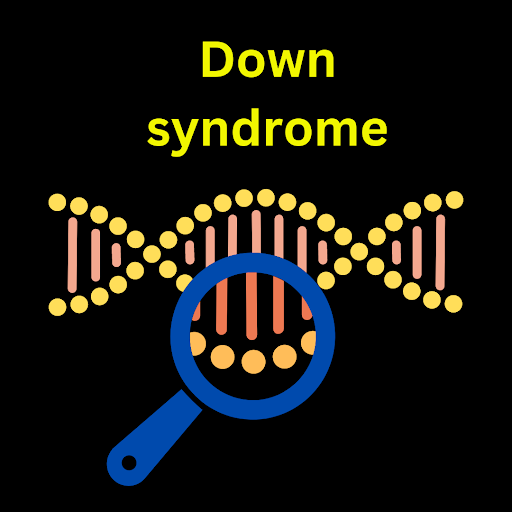Down syndrome, also known as Trisomy 21, happens when a person is born with an extra copy of chromosome 21. Usually, people have 46 chromosomes in their cells, but people with Down syndrome have 47 because of this extra one. This extra chromosome affects how their body and brain develop.
What Causes Down Syndrome?
Down syndrome happens by chance, usually because of a problem when cells divide. The risk of having a baby with Down syndrome is higher for older mothers, but it can happen to anyone.
Types of Down Syndrome
- Trisomy 21 (Full): This is the most common type. All cells in the body have an extra chromosome 21.
- Mosaic Down Syndrome: Some cells have an extra chromosome 21, but others don’t. This can make symptoms milder.
- Partial Trisomy 21: Only a part of chromosome 21 is extra. This also causes milder symptoms.
Common Signs of Down Syndrome
- Physical Features: People with Down syndrome might have a flat face, small ears, and eyes that slant upwards.
- Heart Problems: Half of people with Down syndrome may be born with heart problems.
- Vision and Hearing Issues: They might need glasses or have hearing problems.
- Learning: Children with Down syndrome often learn more slowly than others.
- Health Issues: They might get infections more easily, and some may have thyroid or digestive problems.
Testing for Down Syndrome During Pregnancy
Pregnant women can have tests to see if their baby might have Down syndrome. These tests include:
- Blood tests and ultrasound scans to check for signs of Down syndrome.
- If needed, doctors can do more tests like amniocentesis (taking a sample of the fluid around the baby) to confirm if the baby has Down syndrome.
Caring for Someone with Down Syndrome
Children with Down syndrome need extra care to stay healthy and grow well. They should see doctors often to check their heart, eyes, and ears. Therapists and teachers can also help them learn and develop skills, allowing them to live happy, fulfilling lives.
Can Down Syndrome Be Cured?
There is no cure for Down syndrome, but with proper care, people with Down syndrome can lead healthy and happy lives. Early medical and educational support can make a big difference in their development.
Talking to a Genetics Counselor
If you’re expecting a baby or have a family member with Down syndrome, seeing a genetics counselor can help. They explain how Down syndrome happens and help you understand your testing options.
Take away
Down syndrome is a condition where a person is born with an extra chromosome 21, which affects their development. While there is no cure, early support can greatly improve their health and learning.


